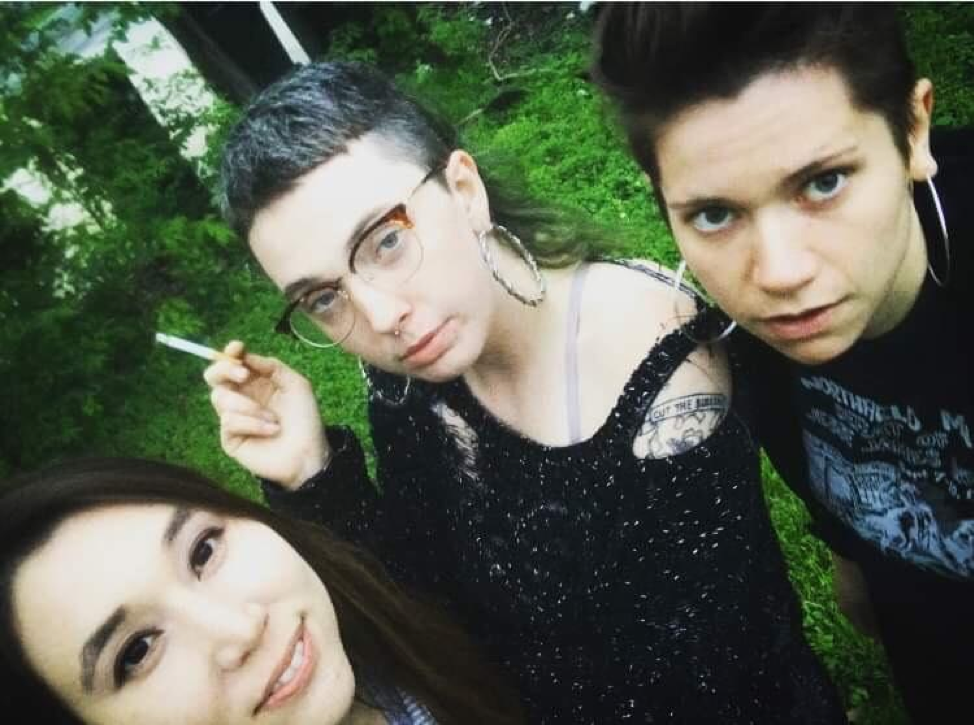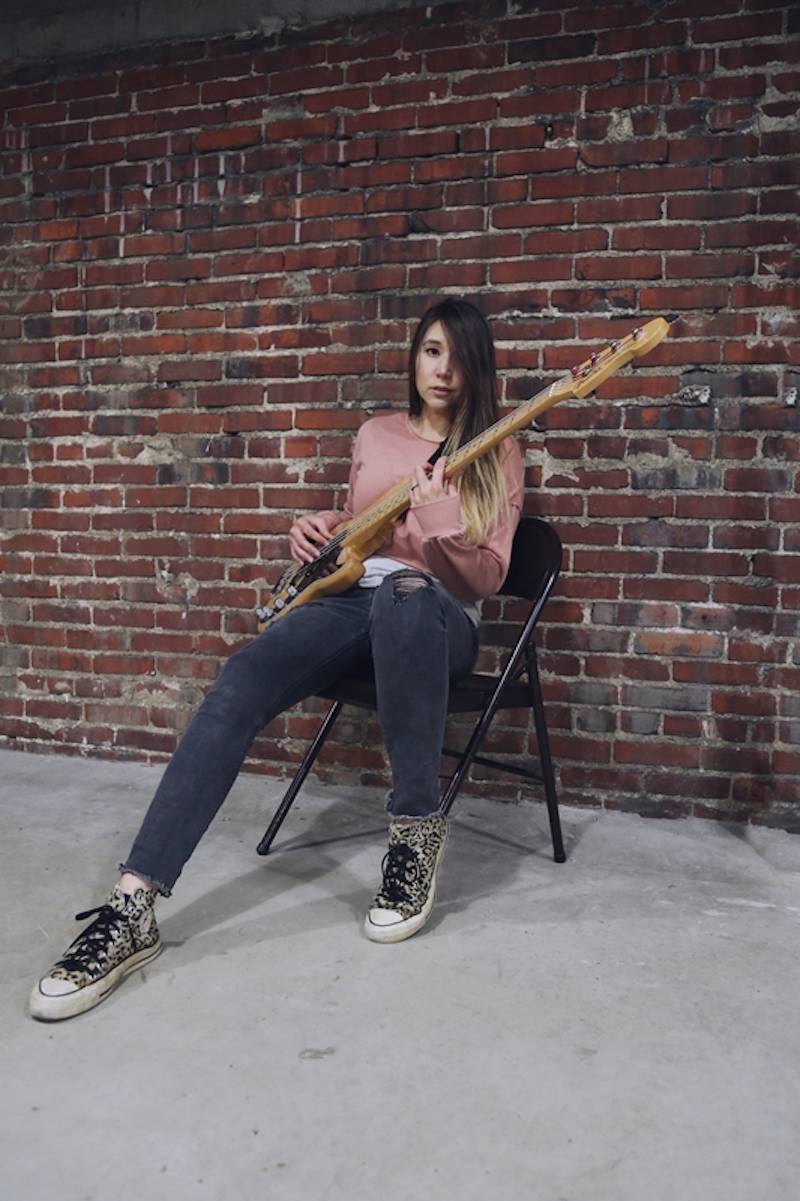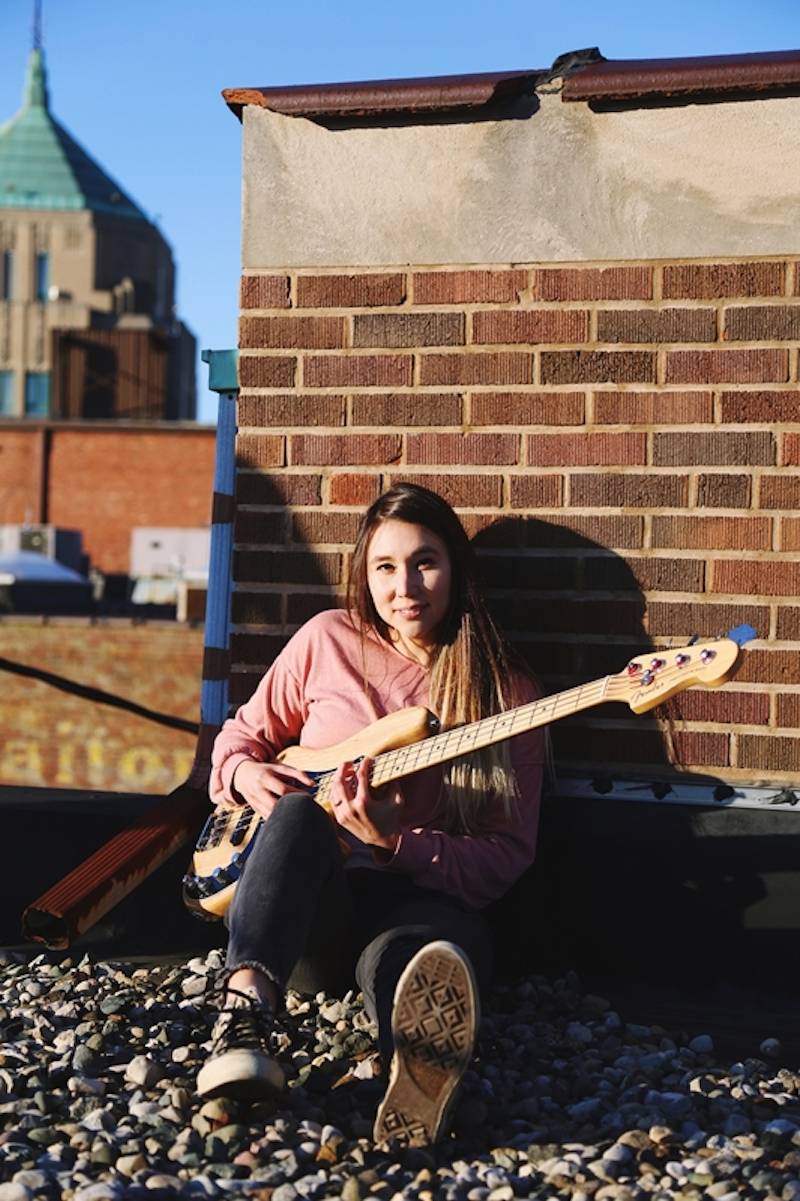Urban or rust-belt industrial areas can be butted right up against university towns. Yet in spirit, they might as well be at opposite points of some boundless expanse. The former, in its way, seems frozen early on in a civilization’s development. Its components are still embroiled in the nobility of plain survival and escapism — presumably fatigued from repetitive and physically demanding work.
Smile Politely: What initially drew you to the bass guitar?
Sara Cramer: I was drawn to the bass because my older brother Ron was learning guitar, and I wanted to be able to play with him. He was a big influence on me when I first started playing. He’s a metal guitarist now, but back then, we would jam in the basement learning covers like Blink 182, Nirvana, Audioslave, or whatever we were listening to back then. I got my first bass when I was like 14 or 15, and I’ve been obsessed with bass ever since.
SP: If you can, explain what about the instrument makes it a good match for you as a person? Is that register where your mind’s ear immediately goes?
 Cramer: Bass is a good match for me because it’s a powerful instrument, but it kinda goes unnoticed by most people. I like not being the center of attention, but still, have a strong role in a group. I don’t know if my mind’s ear immediately goes to bass, but it’s definitely one of the first things I pay attention to. The feel of the song is probably the first thing that hooks me.
Cramer: Bass is a good match for me because it’s a powerful instrument, but it kinda goes unnoticed by most people. I like not being the center of attention, but still, have a strong role in a group. I don’t know if my mind’s ear immediately goes to bass, but it’s definitely one of the first things I pay attention to. The feel of the song is probably the first thing that hooks me.
SP: Obviously, the universal goal of most serious musicians, is the composition of original material. Has doing this always been reflexive for you?
Cramer: In a way, yes, because that’s how I learned with my first band. We spent a lot of time composing and arranging our songs. I’ve been lucky to be around some great songwriters.
SP: Much of the material I’ve heard, which includes you, is reminiscent or possibly even derived from late 1960s rock — the kind that is positive and relaxing. Is this your ideal element as a player? Is this part of your background?
Cramer: The ’60s sound probably comes from a couple of my favorite bassists and biggest influences being James Jamerson and Paul McCartney. However, I definitely don’t try to play 60’s rock. Being positive and relaxing is something that I try to do with my music. This probably comes from playing live so much, and using music as my therapy.
My main band, Relevator, was named after the term relevé, which is a ballet term for rising to the tips of the toes. We have embraced the motto “to uplift” and feel that we’d like to uplift the audience and make them feel good whenever we’re performing. We are going through some changes currently and are redirecting our style to emphasize this more and add more electronic elements.

Photo by Candie Kates
SP: What exactly was your environment during your formative years?
Cramer: At first, I learned a lot from tabs. Then I joined the jazz band and orchestra when I was in high school. I learned how to read bass clef, and playing stand-up in the orchestra was amazing. But most of my bass skills came from working with The Duke of Uke and His Novelty Orchestra. I was lucky to have a big supportive group of my best friends. We were a very hardworking band back then that met every Sunday for our “knitting club” we called it. We learned together how to write songs, orchestrate parts, perform, tour, and manage ourselves.
SP: The societal attitude of isolated university towns is often bifurcated. There are the students to one side, and on the other, the indigenous factor. Do you feel the difference has any effect on musical communities in general, and the C-U musical community in particular?
Cramer: I guess I’m part of the indigenous factor? I’m from Urbana, I never really felt too separated from the University. I loved growing up next to it because I got to see and meet all kinds of players from different musical backgrounds. There’s always awesome new talent flowing through the University and this town’s local scene. I think it makes this a special music scene because of this.
SP: Music as an art form, has added virulence towards the soul, mainly because it has a multileveled theoretical structure (showmanship, theatrics, equipment, social, etc.). Each of these seems to be emphasized according to personality type. More and more, musicians are becoming facile with production software. Does any of this interest you? Or, are you singularly focused on the application of your instrument?
Cramer: Yes, I’m interested in learning that software! I’ve been fortunate to work with some great recording studios and engineers so far. So I’ve never really had to learn, but I have always wanted to take a recording class.
SP: Let’s briefly examine your practice routine. What does it usually entail?
Cramer: Well, I practice whatever I feel like playing at the time, honestly. I’m usually working on writing parts for songs on bass or keys. I’ll warm up by running through something I’m familiar with then dive into writing a part of learning a bassline. Running through scales and metronome work is always good too. I probably don’t do as much of that as I should. Also, my bands meet at a pretty regular clip, about once a week or so.
SP: What’s currently on your list, as far as listening?
Cramer: Moonchild is my favorite band right now, I’m obsessed with them. I listen to all kinds of stuff, though. I keep weft on in the car; they have some programs that I like, especially world music, jazz, and reggae. I mostly listen to my iTunes tho. I checked out Tool’s new album recently, loved it. I don’t know, I listen to all kinds of music, I like a lot of pop stuff too.
SP: What’s coming up? Where will you be working in the near future?
Cramer: So my main performing band Relevator, is taking a bit of a hiatus to redirect our sound. We’re working on new stuff, we want to come up with a brand new set. Kenna is one of my best friends, we’ve been working together for a few years now. She’s really blossomed into an amazing performer and songwriter. I’m excited to go in a new direction with her.
I’m also working with Duke of Uke and His Novelty Orchestra. We’re working on a long-distance project called Alice. It’s a musical about Alice and Wonderland. Dave King has had these songs written for a while, and we’re finally in the process of structuring and recording the songs. The next step is to work with the girls from DUNO and record vocals and instruments. It’ll take a long time because we’re working long distance, but I’m so excited for the final product. It’s been fun to write with a topic in mind and not have to worry about playing live.
There are a couple other projects kinda in the works. I’ve been jamming with a songwriter named Taylor Loveall. I’m mainly playing keys and singing for his songs. He wants to record an EP, so stay tuned for that. Then there’s talk of a female-fronted Led Zeppelin cover band. I’m really hoping we can start working on that soon.
All photos provided by the artist. Top photo by Candie Kates.








